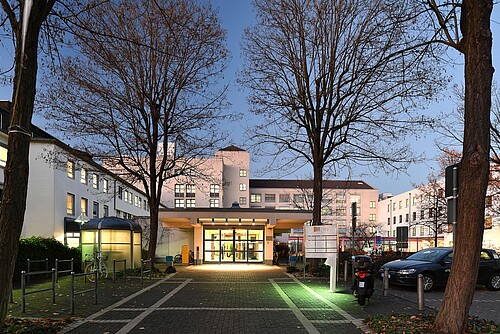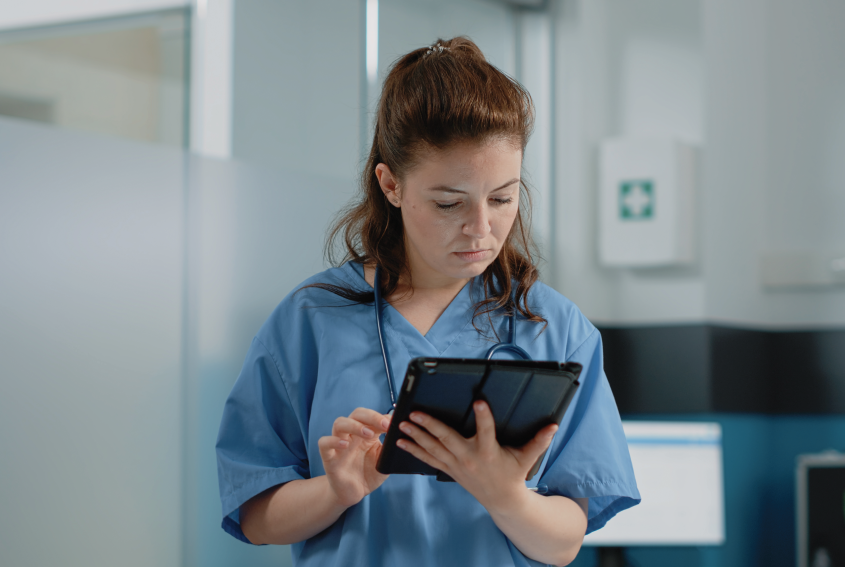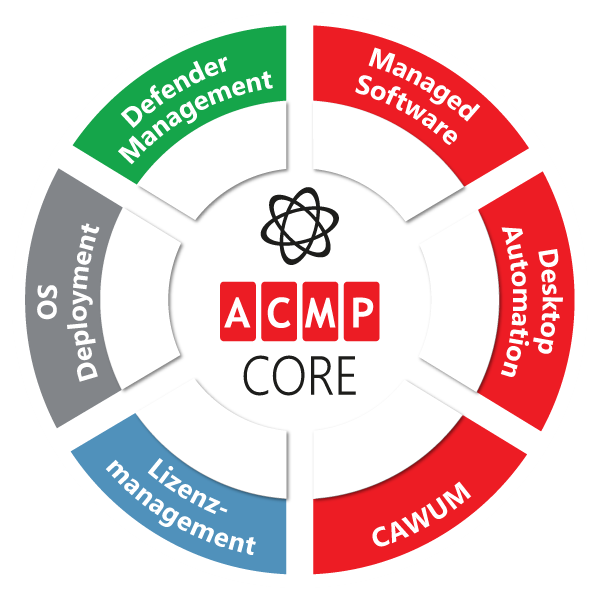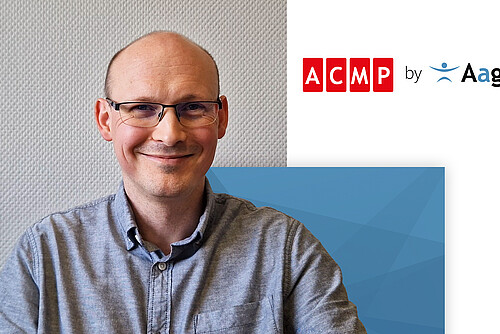
Pages
Events
Whitepapers
Security & Compliance
Legal requirements such as ISO, PDSG and NIS-2 demand the highest security standards. Seamless documentation, secure patch management and strict access controls are essential to ensure data protection and cybersecurity. Automated security solutions facilitate the implementation of these requirements - even in the 24/7 operation of clinics and care facilities.
Scarcity of resources & cost pressure
IT departments in the healthcare sector are faced with the challenge of efficiently managing complex IT infrastructures despite limited budgets and staff shortages. Increasing cost pressure is forcing hospitals to optimise processes in order to remain economical and fit for the future. Automation can help to improve processes and utilise resources in a more targeted manner. The Hospital Future Act (KHZG) provides financial support for digitalisation with a development fund of 4.3 billion euros. So-called must-have applications must be implemented by 31 December 2025 as part of the KHZG.
Inefficient IT infrastructure
Manual processes and a lack of standardisation make IT administration in hospitals and social institutions difficult. Automated software distribution, intelligent licence management and optimised system integration significantly reduce the administrative workload and ensure greater security and stability.
Interoperability & scalability
IT in clinics, care facilities and social services must be flexible, secure and controllable across all locations. A centralised management platform enables the integration of new technologies, simplifies device management and creates a future-proof, scalable IT infrastructure.
Desktop automation: increased efficiency through automated IT processes
ACMP Desktop Automation automates recurring tasks such as software distribution, device configuration and user management. This reduces manual administrative work, optimises processes and relieves the burden on IT teams in hospitals, care facilities and health authorities.
Further information can be found here: ACMP Desktop Automation
CAWUM: Secure and efficient Windows updates in medical facilities
Regular Windows updates are essential for IT security in the healthcare sector. ACMP CAWUM (Complete Aagon Windows Update Management) enables fully automated and secure distribution of updates and selected drivers from third-party catalogues - without the need for WSUS. This saves bandwidth, minimises downtime and ensures a continuously protected IT infrastructure in clinics and practices.
Managed software: centralised software management for secure IT in the healthcare sector
Medical facilities use numerous specialised programs - from practice software to imaging software. ACMP Managed Software ensures that all applications are centrally managed, updated and licenced. This guarantees smooth operation, protects sensitive patient data and minimises security risks due to outdated software versions.
Further information can be found here: ACMP Managed Software
OS Deployment: Fast and standardised operating system installation
In hospitals and care facilities, many PCs and medical devices need to be equipped with identical operating systems. ACMP OS Deployment automates this process and ensures that all systems are installed in a standardised manner - including UEFI and secure boot support. This keeps IT secure, efficient and always up to date.
Further information can be found here: ACMP OS Deployment
Licence management: compliance and cost transparency for healthcare IT
Clinics, laboratories and medical practices have to manage numerous software licences while adhering to strict data protection and compliance requirements. ACMP licence management records all licence types, recognises dependencies and prevents over- or under-licensing. Automated reports make it easier to prove software compliance and help to avoid unnecessary costs.
Further information can be found here: ACMP Licence Management
Defender Management: Effective protection against cyberattacks in the healthcare sector
IT systems in the healthcare sector are a popular target for cyber attacks. ACMP Defender Management enables central control of Microsoft Defender Antivirus, optimises virus scans and reports threats. With comprehensive reports, IT departments maintain control over the security of all networked devices at all times - from administrative PCs to medical technology systems.
Further information can be found here: ACMP Defender Management
1. Why is centralised unified endpoint management particularly important in the healthcare and social services sector?
Hospitals, care homes and social institutions manage a wide range of IT devices - from ward PCs and mobile devices in the care service to networked medical devices. At the same time, strict data protection and security requirements apply. Centralised unified endpoint management ensures automated software distribution, secure patch management and uniform control over all end devices, thereby guaranteeing the necessary security and efficiency.
2. How does ACMP support social services, hospitals and care facilities in complying with legal regulations (ISO, PDSG, NIS-2)?
Healthcare facilities must fulfil high data protection and security requirements. The Patient Data Protection Act (PDSG), ISO 27001 certification and the EU NIS-2 directive demand a high level of IT security. ACMP facilitates the implementation of these requirements with automated vulnerability management, automated responses and seamless documentation - essential for audits and compliance checks.
3. What advantages does automation offer IT departments in the healthcare sector?
In hospitals and care facilities, IT systems run around the clock and must function stably and securely. Automated processes reduce maintenance costs by centrally managing software updates, operating system installations and security patches. This allows IT teams to minimise downtime and focus on critical tasks.
4. How does ACMP help to overcome the shortage of skilled labour in the IT sector?
Many social services and care facilities have small IT teams that have to manage numerous locations and devices. ACMP automates recurring tasks such as software distribution or licence management, reducing the workload of IT staff. In addition, the intuitive operation enables quick familiarisation, even for less specialised IT staff.
5. Can ACMP be used in care facilities with multiple locations?
Yes, ACMP is also suitable for facilities with multiple locations, as it enables centralised IT management. For example, care facilities or hospital groups can control software updates and security guidelines uniformly across all facilities - regardless of their size or infrastructure.
6. What security measures does ACMP offer for hospitals and care facilities?
Hospitals and care facilities are increasingly the target of cyber attacks. ACMP helps to secure IT systems with vulnerability management, automated Windows updates and software distribution.
7. How long does it take to implement ACMP in healthcare facilities?
The duration of the implementation depends on the size of the organisation and the existing IT systems. Smaller organisations can introduce ACMP within a few days, while large hospital groups with complex IT structures require several weeks for a complete implementation. Thanks to preconfigured modules, however, the rollout can take place without interrupting ongoing operations.
8. What training programmes are available for IT teams in the healthcare sector?
Aagon offers practical introductory workshops, administrator training and webinars on current security topics. Large organisations can also book customised training concepts that are tailored to their specific requirements.
9. What advantages does ACMP offer over conventional IT management tools?
Thanks to its optimised focus on the requirements of medium-sized IT departments, ACMP is also ideal for use in the healthcare sector. A quick and uncomplicated rollout is therefore possible without any problems. It combines powerful automation, high security standards and flexible scalability. This means that both small care facilities and large hospital groups can manage their IT efficiently and fulfil legal requirements more easily.
Es scheint, als wären Sie auf nicht auf der gewünschten Sprachversion dieser Website gelandet. Möchten Sie wechseln?




